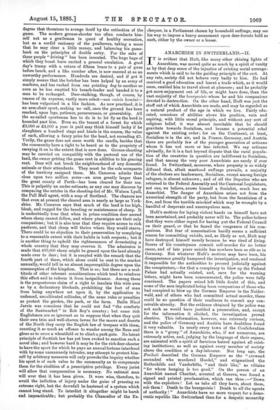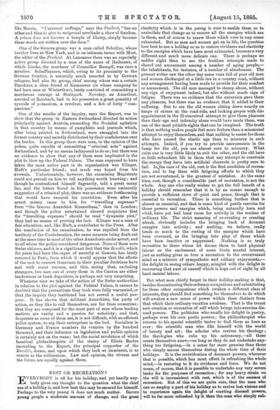ANARCHISM IN SWITZERLAND.—II.
IT is evident that Haft, like many other shining lights of Anarchism, was moved quite as much by a spirit of vanity as by that deep sense of the injustice of existing social arrange- ments which is said to be the guiding principle of the sect. At any rate, society did not behave very badly to him. He had received a good education and learnt a trade which, as it would seem, enabled him to travel about at pleasure ; and he probably got more enjoyment out of life, or might have done, than the vast majority of the bourgeoisie whom he and his companions devoted to destruction. On the other hand, Haft was just the stuff out of which Anarchists are made, and may be regarded as a natural product of the age in which we live. Fairly edu- cated, conscious of abilities above his position, vain and aspiring, with little moral principle, and without any• sort of religious belief, it was almost inevitable that he should gravitate towards Socialism, and became a potential rebel against the existing order ; for on the Continent, at least, Socialism is in the air, and in France, Germany, and Austria there are probably few of the younger generation of artisans whom it has not more or less infected. We say artisans advisedly, for it is a fact beyond dispute that the rural popula- tion of the countries in question are indifferent to Socialism, and that among the very poor Anarchists are rarely if ever found. In Switzerland, moreover, where property is so widely diffused that, albeit manhood suffrage prevails, a majority of the electors are landowners, Socialism, except among foreign refugees, is almost unknown ; and of all the Deputies who are returned to the Federal Assembly and the Cantonal Legislature, not one, we believe, avows himself a Socialist, much less an Anarchist. The danger of Anarchism arises not from the numerical strength of the party, but from the fanaticism of a few, and from the terrible mischief which may be wrought by a handful of desperate and unscrupulous men.
Haft's motives for laying violent hands on himself have not been ascertained, and probably never will be. The police believe that they were either regret for having put the Federal Council on their guard, or that he feared the vengeance of his com- panions. But fear of assassination hardly seems a sufficient reason for committing suicide, and, as likely as not, Haft may have destroyed himself merely because he was tired of living. Scores of his countrymen commit self-murder for no better cause, and of late years suicide has nowhere been so rife as in Germany. But whatever Haft's motives may have been, his disappearance greatly hampered the investigation, and rendered it impossible for the authorities to proceed judicially against the conspirators,—for that a conspiracy to blow up the Federal Palace had actually existed, and, save for the warning letters, might have been consummated, the police were fully convinced. The papers seized left little doubt of this, and some of the men implicated being boon companions of those who had conspired to blow up the German Emperor in the Neider- wald, and of others who had committed actual murder, there could be no question of their readiness to commit any con- ceivable atrocity. But the evidence obtained by the police was not such as would have justified a prosecution, and, except for the information it elicited, the investigation proved abortive. This information, however, was extremely curious, and the police of Germany and Austria have doubtless found it very valuable. In nearly every town of the Confederation there is a " group " of Anarchists, who, if not numerous, are extremely active, and, judging by the language of their organs, are animated with a spirit of ferocious hatred against all exist- ing institutions, as well as against every member of society above the condition of a day-labourer. Not long ago, the Freiheit described the German Emperor as the "crowned scoundrel who murdered Hoedel," and stigmatised the Rothschilds and Vanderbilts, " and their like," as villains "for whom hanging is too good." On the person of an Anarchist named Charitat, arrested at Geneva, was found a signed and printed proclamation, which ran thus :—" Down with the exploiters ! Let us take all they have, shoot them, rob them ! Death to the bourgeoisie ! Death to all the agents of authority ! " Anarchists have no more respect for a demo- cratic republic like Switzerland than for a despotic monarchy like Russia. "Universal suffrage," says the Freiheit, "has no other end than to give to reciprocal servitude a show of freedom. A prison does not become a temple of liberty, simply because these words are written over the door."
One of the Geneva group was a man called Schultze, whose brother lives at New York, and is on intimate terms with Most, the editor of the Freiheit. At Lausanne there was an especially active group directed by a man of the name of Hellmann, of which Lieske, the murderer of Councillor Rnmpff, was once a member. Schaffhausen, which, owing to its proximity to the German frontier, is naturally much resorted to by German refugees, had also its group, chief among whom was a certain Daschner, a close friend of Kammerer (in whose company he had been eeen at Winterthur), lately convicted of committing a murderous outrage at Stuttgart. Novotny, an Anarchist, arrested at Rossbach, had in his possession a great quantity of cyanide of potassium, a revolver, and a list of forty "com- panions."
One of the results of the inquiry, says the Report, was to show that the group in Eastern Switzerland directed its action principally against Austria, promoting the Socialist agitation in that country by means of pamphlets and journals which, after being printed in Switzerland, were smuggled into the former country and secretly distributed by their confederates over the border. In this group there were men, in the opinion of the police, quite capable of committing " criminal acts " against Switzerland, and by no means indisposed to do so; but there was no evidence to show that any of them were implicated in the plot to blow up the Federal Palace. The man supposed to have taken the most active part in its organisation was Klinger, Haft's particular friend ; and much was hoped from his avowals. Unfortunately, however, the examining Magistrate could not prevail on him to tell anything worth knowing ; and though he contradicted himself flagrantly, told a great many lies, and the letters found in his possession were eminently suggestive of a criminal plot, there was no evidence forthcoming that would have ensured his conviction. Even after his arrest money came to him for "travelling expenses" from "the famous Anarchist Knanerhase," then in London; and though the police entertained shrewd suspicions that for " travelling expenses " should be read " dynamite plot," they had no means of proving the fact. Klinger was a man of fair education, and, like Huft, a contributor to the Press. After the conclusion of his examination, he was expelled from the territory of the Confederation, the same measure being dealt out at the same time to most of the other Anarchists under arrest, and to all whom the police considered dangerous. None of them were Swiss citizens, and it is a significant fact that the Revolts, which for years had been the organ of anarchy at Geneva, has lately removed to Paris, from which it would appear that the efforts of the sect to convert Genevans to their peculiar doctrines have met with scant success, and this, seeing that, excluding strangers, two men out of every three in the Canton are either landowners or bank depositors, is perhaps not very surprising.
Whatever view we take of the action of the Swiss authorities in relation to the plot against the Federal Palace, it cannot be doubted that the precautions they took were fully warranted, or that the inquiry they instituted has not served a useful pur- pose. It has shown that militant Anarchists, the party of action, as they like to call themselves, are far from numerous; that they are composed for the most part of men whose leading motives are vanity and a passion for notoriety; and that, desperate as some of them are, it is not difficult, with an efficient police system, to nip their enterprises in the bud. Socialism in Germany and France numbers its votaries by the hundred thousand, and their influence on legislation and public opinion is certainly not on the wane; but the social revolution of which fanatical philanthropists of the stamp of Elise Reclus (according to the Report, the principal supporter of the Revolts), dream, and upon which they look as imminent, is as remote as the millennium. Law and opinion, the virtues and the forces, are equally against them.



































 Previous page
Previous page